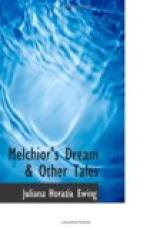The day, as may be supposed, is looked forward to with no small amount of anxiety; very clean and tidy are the little shoes placed by the young expectants; and their parents—who have threatened and promised in St. Nicholas’s name for a year past—take care that, with one sort of present or the other, the shoes are well filled. The great question—rods or sweetmeats—is, however, finally settled for each individual before breakfast-time on the great day; and before dinner, despite maternal warnings, most of the said sweetmeats have been consumed. And so it came to pass that Friedrich and his brothers and sisters had hit upon a plan for ending the day, with the same spirit and enjoyment with which it opened.
The mother, by a little kind manoeuvring, generally induced the father to sup and take his evening pipe with a neighbour, for the tradesman was one of those whose presence is rather a “wet blanket” upon all innocent folly and fun. Then she good-naturedly took herself off to household matters, and the children were left in undisturbed possession of the stove, round which they gathered with the book, and the game commenced. Each in turn read whichever poem he preferred; and the reader for the time being, was wrapt in a huge hood and cloak, kept for the purpose, and was called the “Maerchen-Frau,” or Story Woman. Sometimes the song had a chorus, which all the children sang to whichever suited best of the thousand airs that are always floating in German brains. Sometimes, if the ballad was a favourite one, the others would take part in any verses that contained a dialogue. This was generally the case with some verses in the pet ballad of Bluebeard, at that exciting point where Sister Anne is looking from the castle window. First the Maerchen-Frau read in a sonorous voice—
“Schwester Aennchen,
siehst du nichts?”
(Sister Anne, do you see nothing?)
Then the others replied for Anne—
“Staeubchen fliegen,
Graeschen wehen.”
(A little dust flies, a little
grass waves.)
Again the Maerchen-Frau—
“Aennchen, laesst sich
sonst nichts sehen?”
(Little Anne, is there nothing
else to be seen?)
And the unsatisfactory reply—
“Schwesterchen, sonst
seh’ ich nichts!”
(Little sister, I see nothing
else!)
After this the Maerchen-Frau finished the ballad alone, and the conclusion was received with shouts of applause and laughter, that would have considerably astonished the good father, could he have heard them, and that did sometimes oblige the mother to call order from the loft above, just for propriety’s sake; for, in truth, the good woman loved to hear them, and often hummed in with a chorus to herself as she turned over the clothes among which she was busy.
At last, however, after having been for years the crowning enjoyment of St. Nicholas’s Day, the credit of the Maerchen-Frau was doomed to fade. The last reading had been rather a failure, not because the old ballad-book was supplanted by a new one, or because the children had outgrown its histories; perhaps—though they did not acknowledge it—Friedrich was in some degree to blame.




